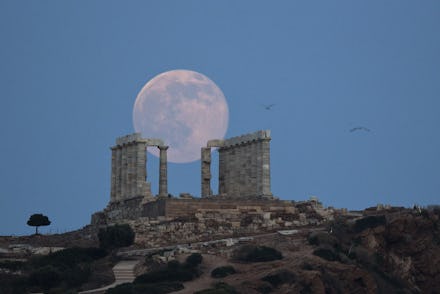Bones Found in Greece May Have Belonged to Teen Sacrificed to Zeus

Archaeologists think they've found proof that ancient Greeks sacrificed humans to the gods after the 3,000-year-old bones of a young man were discovered during the excavation of Mount Lykaion in Arcadia, Greece.
The researchers from the University of Arizona haven't published their results in a peer-reviewed journal yet, meaning the findings from the ancient altar to Zeus — once worshipped as the birthplace of the Greek god and literally covered in ancient animal sacrifices, according to the Associated Press — haven't been analyzed by experts not affiliated with the dig. In other words, there's still a chance the connection between the bones and a human sacrifice could be debunked.
However, if the findings from Mount Lykaion turn out to be what the archaeologists think, it could be significant.
"Several ancient literary sources mention rumors that human sacrifice took place at the altar, but up until a few weeks ago there has been no trace whatsoever of human bones discovered at the site," excavator David Gilman Romano, professor of Greek archaeology at the University of Arizona, said, according to the AP.
Questions still remain — like why someone was buried at a place for sacrifice.
"Whether it's a sacrifice or not, this is a sacrificial altar," Romano said, "so it's not a place where you would bury an individual. It's not a cemetery."
It's that detail that makes associate professor of Greek art, architecture and archaeology Ioannis Mylonopoulos suspicious of the date of the sacrifice, he told the Washington Post. In fact, he said, it's possible the body was actually buried at the site much later than when animals were sacrificed there.
Mylonopoulos told the Post that human sacrifice wasn't unheard of. Other archaeologists had published reports confirming the practice. But it's the state this one was found in — headless, save the lower jaw — that he found suspicious. It may even signify some other ritual was involved.
"If there are indeed finds from this period from within the rather careless tomb, then the most convincing interpretation at this stage would be that we are indeed dealing with a human sacrifice and that the deceased was buried within the ash altar as a form of honor," Mylonopoulos said.
Again, the findings have yet to be peer-reviewed. But since the altar area is currently only about 7% excavated, we may see a lot more explanation of what went on at the place of Zeus's worshippers in the coming months or years. Then again, maybe not.
"We have a number of years of future excavation to go," Romano told the AP. "We don't know if we are going to find more human burials or not."